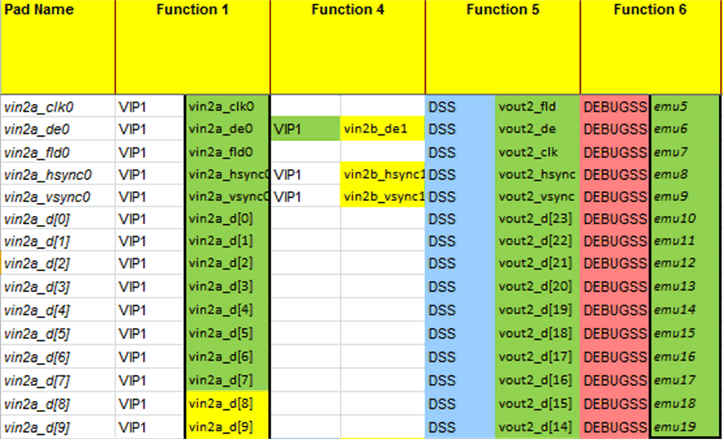SPRUIF3B May 2017 – March 2019 DRA790 , DRA791 , DRA793 , DRA797
-
DRA79x EVM CPU board
- Trademarks
- 1 Introduction
- 2 Overview
- 3
Hardware
- 3.1 Hardware Architecture
- 3.2 DRA71x, DRA79x, TDA2E-17, and AM570x Processor
- 3.3 Power Architecture
- 3.4 Reset Structure
- 3.5 Clocks
- 3.6
Memory
- 3.6.1 SDRAM Memory
- 3.6.2 QSPI Flash Memory
- 3.6.3 EMMC Flash Memory
- 3.6.4 MicroSD Card Cage
- 3.6.5 GPMC NOR Flash Memory
- 3.6.6 GPMC NAND Flash Memory
- 3.6.7 Boot Modes
- 3.6.8 JTAG/Emulator and Trace
- 3.6.9 UART Terminal
- 3.6.10 DCAN and CAN Interfaces
- 3.6.11 Universal Serial Bus (USB)
- 3.6.12 Wired Ethernet
- 3.6.13 Video Output
- 3.6.14 Video Input
- 3.6.15 Mini-PCIe
- 3.6.16 Media Local Bus (MLB)
- 3.6.17 Audio
- 3.6.18 COM8 Module Interface
- 3.6.19 eFuse Programming Supply
- 3.6.20 User Interface LEDs
- 3.6.21 Power Monitoring
- 3.6.22 I2C Peripheral Map
- 3.6.23 GPIO List
- 3.6.24 I/O Expander List
- 3.6.25 Configuration EEPROM
- 4
Signal Multiplex Logic
- 4.1 GPMC and QSPI Selection (MUX A)
- 4.2 GPMC, VIN1, and VOUT3 Selection (MUX B)
- 4.3 GPMC and EMMC Selection (MUX C)
- 4.4 VIN2A and EMU Selection (MUX D, MUX E)
- 4.5 VIN2A and RGMII1 Selection (MUX F)
- 4.6 RGMII0 and VIN1B Selection (MUX J)
- 4.7 SPI2 and UART3 Selection (MUX K)
- 4.8 DCAN2 and I2C3 Selection (MUX L)
- 5 USB3 Supported Configurations
- 6 References
- Revision History
4.4 VIN2A and EMU Selection (MUX D, MUX E)
Figure 14 is part of the SoC pinmux table for VIN2A. The SoC device supports additional functions not shown in the table. The functions shown are intended to reflect those supported on the EVM. These functions include:
- Video Input Port (VIN2A): CLK, HSYNC, VSYNC, DE, D[9:0]
- Video Output Port (VOUT2): CLK, HSYNC, VSYNC, DE, D[23:14]
- Debug/Trace (EMU): EMU[19:5]
 Figure 14. SoC Pinmux for VIN2A and EMU
Figure 14. SoC Pinmux for VIN2A and EMU MUX D: Selects between onboard support and expansion support for the VIN2A, EMU signals. The selection is made using the I/O expander 3, bits P6 and P2. The default mode is set to onboard peripheral selection, such JTAG/Trace can be supported without I2C accesses.
MUX E: Selects between LI Camera, FPD-Link transmitter, and JTAG/Trace. The selection is made using the I/O expander 2, bits P17 and P14. The default mode is set to EM, such JTAG/Trace can be supported without I2C accesses. Figure 15 shows the MUX diagram for VIN2A and EMU
 Figure 15. MUX Diagram for VIN2A and EMU
Figure 15. MUX Diagram for VIN2A and EMU